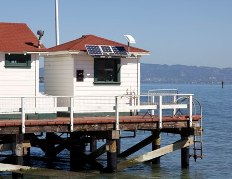Federal officials this week launched a new climate change research center, designed to be a hub for studies on the impacts of climate change on the San Francisco Bay and coastline.

The Ocean Climate Center is housed in a collection of century-old military buildings on the edge of the Bay at Crissy Field. It couldn’t be a more picturesque — and critical — location. Adjacent to the oldest tidal gauge in North America, the center will allow cash-strapped federal agencies to pool resources into climate change research and work with natural resource managers to combat negative impacts on the marine ecosystem and communities along the coastline.
DeWayne Cecil of the National Oceanic and Atmospheric Administration (NOAA) said the center is a first-of-its-kind collaboration among federal agencies on the West Coast, including NOAA, the Department of Interior parks and marine fisheries services, and the US Geological Survey (USGS).
“We all have dwindling budgets to do basic and applied research to respond to societal needs,” said Cecil. “As those budgets dwindle we can put together centers like this where we can all work together to leverage our funding.”
Patrick Barnard, a coastal geologist with USGS, said the center was located in San Francisco because of the degree of scientific research already underway here. The center’s reach will stretch across the Gulf of the Farallones National Marine Sanctuary, from the Farrallon Islands to Suisun Bay and along the coastline up to Point Reyes.
A $100 million research grant has been designated for the first joint project to study sea level rise and storms along the coast and the communities most vulnerable. Barnard said the results of the two-year study will be translated into tools for community planning.
“All these agencies working together gives more credence to the data that comes out of it instead of one isolated institution,” Barnard said. “The collaboration is important in getting more of a foothold in the public mindset in what’s going to happen.”
The center will also be hosting real-time “webinars” for the public to ask questions of scientists. A separate visitors’ center is planned to open in a few years, to explain how the changing climate will affect the Bay Area.
Alison Hawkes is a San Francisco-based environmental journalist and co-founder of the Way Out West News website.
